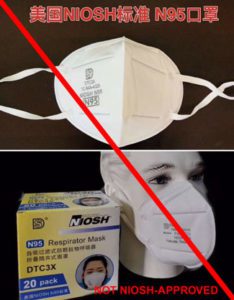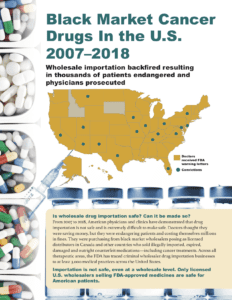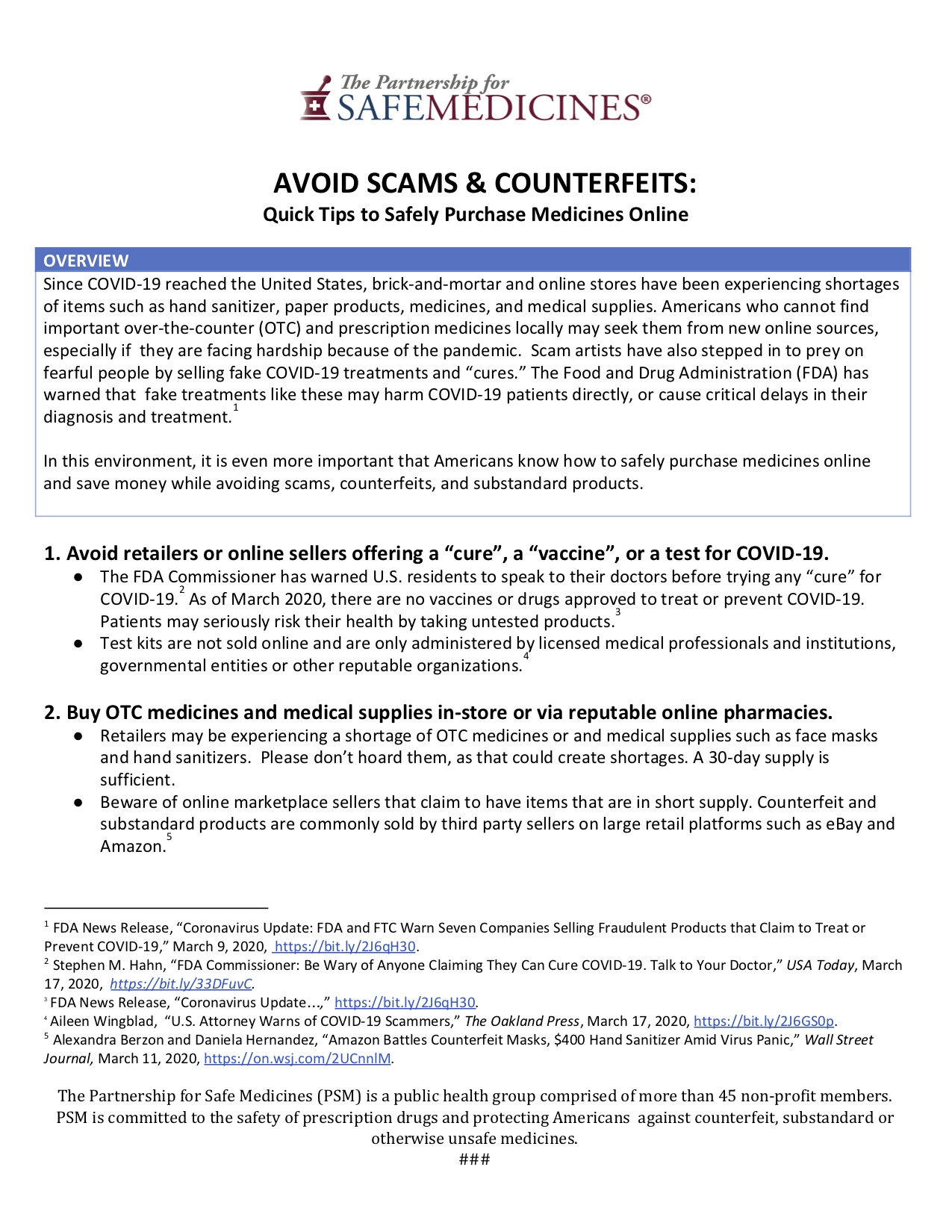May 27, 2020 #covidscams video: Fake N95 masks threaten our first responders and healthcare workers
The era of COVID-19 has been marked by shortages of medical equipment—hand sanitizer, test kits, gloves and, most of all, protective masks for healthcare workers and first responders. On May 13th, the Associated Press (AP) published a disheartening investigative piece–one in a series about the challenges of a worldwide medical supply chain–that shows just how difficult it is to establish that important medical supplies are safe and effective over the whole course of the purchasing process. In it, the AP explains how and why millions of counterfeit and substandard medical masks have been circulating in the U.S. since March.
Counterfeit N95 masks

A counterfeit respirator marked with a Shanghai Dasheng's NIOSH approval number. April 2020.
In March 2020, during a period of much-publicized mask shortages for healthcare workers, a shipment of counterfeit N95 masks arrived at Los Angeles International Airport. The boxes in which the masks came bore the logo of approved Chinese supplier Shanghai Dasheng and each mask was stamped to indicate that it met the standards of the U.S. National Institute for Occupational Safety and Health (NIOSH). According to the AP, who interviewed more than a dozen buyers, distributors and middlemen involved in the sale, documentation suggested that the masks originated with Shanghai Dasheng Health Products Manufacture Company. But they also came with earloops to secure the masks to peoples’ faces, rather than elastic that stretched over the back of the wearer’s head. This feature which does not adequately shield medical workers and first responders from infectious disease, and also marked the masks as counterfeit: Shanghai Dasheng’s NIOSH-approved masks did not have ear loops. NIOSH has added at least 12 different kinds of masks that are counterfeit or falsely claim to be NIOSH-approved on their Counterfeit Respirators page since the pandemic broke out.
The AP’s reporting shows that masks like these found their way to an international humanitarian aid organization and nurses in southern California, a hospital in Massachusetts, and a pediatric physician’s assistant in Virginia. They also made their way to West Virginia, where the state’s Military Affairs and Public Safety distributed 50,000 of them to paramedics and firefighters, prison guards and hospital workers, declaring them adequate even after he had seen an explicit counterfeit counterfeit warning.
Substandard and/or Counterfeit KN95 Masks
Complicating this picture, the U.S. Food and Drug Administration responded to acute shortages of NIOSH-approved N95 masks by turning to similar masks approved for use in Europe, Australia, Brazil, Japan, Korea and Mexico in late March and then to KN95 masks that Chinese hospitals supply to their medical staff in early April. The KN95 masks were acceptable as long as an accredited test laboratory would certify that they met CDC standards, filtering “95 percent of particles that are 0.3 microns or larger, including the new coronavirus.” On May 7, after both the CDC and the FDA did their own testing, the FDA banned 65 of 80 Chinese suppliers because their masks did not meet N95 standards. One mask filtered only 24 to 35 percent of particles. Millions of KN95 masks were imported between April 3 and May 7 and many are still in circulation. It is difficult to know how much harm they have caused or even whether they were counterfeit or merely poorly manufactured. As of April 27, however the CDC was reporting that more than 9,000 healthcare workers had contracted the coronavirus, and at least 27 had died because of it.
Fraudulent Mask Sales
In addition to the fake and poor quality masks that the AP has been documenting, there has also been a rash of fake mask acquisition deals. States desperate to protect their essential workers have been casting wide nets to find supplies and they are being taken advantage of by fake vendors collecting exorbitant fees for masks they never deliver. In Florida, Indiana, Wisconsin and New York, 3M has filed injunctions against vendors who each tried to sell millions (and in one case billions) of masks at inflated prices to state emergency officials while falsely claiming to be certified 3M resellers.
Florida has had a particularly hard time. According to The Miami Herald, Florida’s Division of Emergency Management launched a massive effort the first week of April to secure masks in the face of a looming shortage. The Division issued $600 million in no-bid purchase orders for N95 masks in just seven days, and stepped outside of 3M’s approved reseller community to do it. Between national competition for the masks and fake 3M resellers selling masks they did not have, none of the 90 million N95 respirators Florida tried to buy materialized. As a result, the state struggled to deliver the products its essential workers desperately needed.
Medical counterfeiting isn’t a new phenomenon

Read about Black Market Cancer Drugs in the U.S.
Counterfeiting and fraudulent sales of medical products happen even in the U.S., and even when we are not in the middle of a pandemic. Perhaps the most noteworthy example in recent years is Avastin, a cancer treatment developed by Genentech and approved by the FDA, and made available for sale via a very small number of distributors beginning in 2004. In 2012 the FDA found that fake versions of Avastin that did not contain its active ingredient had been sold to U.S. medical practices. Ultimately the FDA identified several sellers, including a prominent Canadian drug wholesaler, that had pitched physicians and clinics in 47 states a “cheaper” version of Avastin. These criminal companies were not authorized Avastin distributors, but the doctors and clinics bought the drug for their patients for a discount because the cheap price allowed them to make extra money. In the same way that we have no idea about the impact of fake N95 masks, we have no idea how many people succumbed to cancer because the Avastin their oncology practice bought was counterfeit.
Cases like these are why the United States has a federally regulated track and trace system that has produced and protects the safest pharmaceutical supply in the world. Track and trace, however, can only work with appropriate enforcement and oversight.
Support HR5663, “The Safeguarding Therapeutics Act”
Since the shortage in N95 masks began, Customs and Border Protection and FDA agents have been regularly seizing shipments of these counterfeits as they come into the country. Agents who seize counterfeit medicines have the authority to destroy them, but because of regulatory inconsistencies, they do not always have the authority to destroy fake medical devices. Sometimes they have to return them to the sender, which means that the device can be mailed again and again until inspectors miss it and it gets to its destination.
To remedy that, three members of Congress recently introduced HR5663, “The Safeguarding Therapeutics Act” which would give the FDA unequivocal power to seize and destroy counterfeit medical devices like fake masks and fake test kits. The Partnership for Safe Medicines recently endorsed this legislation, and you should, too. Write to your members of Congress using the form at the top right and tell them the FDA should have the unequivocal power to destroy counterfeit medical devices.
Sources in this week’s video and post:
About Masks:
- “3M Has Sued 5 Vendors Who Targeted Emergency Officials in 3 States Offering Billions of Nonexistent N95 Respirators,” BusinessWire, May 1, 2020.
- “CBP Baltimore Field Office Continues to Seize Counterfeit and Unapproved COVID-19 Protective Equipment and Medications,” U,S. CBP, May 11, 2020.
- Kenneth Chang, “F.D.A. to Allow Use of KN95 Masks Approved by China,” New York Times, April 3, 2020.
- “Counterfeit Respirators / Misrepresentation of NIOSH-Approval,” NIOSH, updated May 22, 2020.
- “Factors to Consider When Planning to Purchase Respirators from Another Country,” U.S. CDC, last reviewed May 11, 2020.
- Gage Goulding, “West Virginia First Responders Using Counterfeit Masks?” WTOV 9, May 5, 2020.
- Austen Hufford, “3M Sues Mask-Seller for Alleged Gouging, Trademark Infringement,” The Wall Street Journal, April 10, 2020.
- Mary Ellen Klas and Ben Wieder, “Inside Florida’s Frenzied, Failed Dash to Dole Out $600 Million in No-bid Mask Deals,” The Miami Herald, April 7, 2020.
- -- “Maker of Essential N95 Masks Says It’s Targeting Florida’s Fraudsters and Profiteers, The Miami Herald, April 17, 2020.
- Geoff Leo, “Health Canada Issues Recall of Some KN95 Masks Made in China,” CBC, May 13, 2020.
- Juliet Linderman and Martha Mendoza, “Counterfeit Masks Reaching Frontline Health Workers in U.S.,” AP News, May 13, 2020.
- Joe Severino, “State Officials Dismiss Questions of Masks' Authenticity; State Emergency Managers Say Ear Loops Raised Concerns,” Charleston Gazette-Mail, May 5, 2020.
- Jack Nicas and Sheila Kaplan, “F.D.A. Bans Faulty Masks, 3 Weeks After Failed Tests,” New York Times, May 7, 2020.
- Adrianna Rodriguez and Ken Alltucker, “Thousands of Health Care Workers Sickened by COVID-19 and 27 Dead, CDC Report Says,” USA Today, April 14, 2020.
Counterfeit Avastin:
- Rex Barber, “Sentencing Set for June as Johnson City Cancer Doctor Pleads Guilty to Federal Charge,” December 11, 2012.
- Black Market Cancer Drugs in the U.S., 2007-2018, The Partnership for Safe Medicines, 2018
- “Avastin Approval History,” Drugs.com
- “Historical Information: FDA Issues Letters to Doctors Who May Have Purchased Counterfeit or Unapproved Prescription Drugs, 2012-2014,” U.S. FDA, last updated July 2, 2019.
- “November 28, 2016: Iowa Cancer Clinic and Oncologist to Pay More Than $176,000 To Settle False Claims Act Allegations...,” U.S. Department of Justice Press Release, U.S. FDA, November 28, 2016.
- Kate Traynor, “FDA, Genentech Warn of Counterfeit Avastin,” American Society of Health-System Pharmacists, February 15, 2012.
HR 5663:
- “Bipartisan Bill to Destroy Fake Imported Medical Devices Needs to Be Part of Coronavirus Response,” U.S. Senate Energy & Commerce Committee, March 23, 2020
- HR5663, “The Safeguarding Therapeutics Act,” Congress.gov, introduced January 21, 2020.
There are many more scams we can’t fit into our weekly episode. Follow us on Facebook, Twitter or Linkedin to get them. Read all our COVID-19 coverage.
HR5663, “The Safeguarding Therapeutics Act” gives the FDA unequivocal power to seize and destroy counterfeit medical devices like fake masks and fake test kits. Ask Congress to empower FDA to protect our front line workers.
Adopt our Covid Safety campaign!
Post our one pager to your website and to social media. Use the hashtag #covidscams to help raise awareness of criminals using the crisis to prey on people. Drop us a note at editors@safemedicines.org to let us know you're helping!

